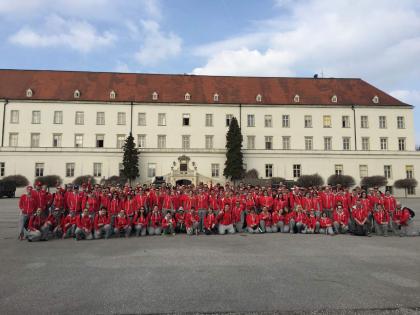
Our programs provide participants with physical fitness and conditioning; improved balance, coordination and body control; increase in sport skills and competitive skills; and an increase in self-confidence and social skills. But Special Olympics is about much more than sports and fitness.
The movement’s true power lies in its ability to create change in the lives of the children, youth and adults registered in our programs, but also in the communities in which they live.
For people with an intellectual disability, Special Olympics is often the only place where they have an opportunity to develop a strong belief in themselves. Through Special Olympics, they begin to see themselves differently. Whether by stepping onto the ice or onto the track, they now see themselves as athletes who can do so much more.
“What struck me most was the players’ appreciation for the opportunity to compete. Sure, they could play floor hockey on any given day in a gymnasium, but there was something so special about a tournament. Like hockey players of all ages and levels across Canada, competing in a new locale against unknown opponents elevated their game to a new level. There was always talk of tomorrow’s “big game”. This was clearly an athletic event, not a social one. […] I now understand the disparate abilities of Special Olympics athletes. The organization provides a great service to all its athletes by simply creating opportunities for them to participate in athletic activity.”
- Bobby Smith, NHL legend, excerpted from Make No Small Plans: Celebrating 40 Years of Special Olympics in Canada
Empowerment Through Sport
Special Olympics athletes gain confidence and skills that translate into many areas of their lives:
- Research undertaken in the US has shown that those registered in Special Olympics programs are five times more likely to work than those who are not. Special Olympics offers each person the opportunity to actively participate in our movement as leaders, not just as recipients of services.
- Through Athlete Leadership, many will share their stories of accomplishments and success in Special Olympics when speaking to the public or as board members. In the fall of 2016, Special Olympics athletes gathered from across our country and met with Members of Parliament and the Senate in Ottawa for our third Hill Day initiative.
- Special Olympics athlete Matthew Williams from Langley, BC now chairs the Global Athlete Congress, which discusses the future of the movement and ensures the athlete voice is heard and considered.
Changing Attitudes
Part of the Special Olympics mission is to provide education and awareness about the dignity and gifts of all people to the general public. Most attitudes toward people with an intellectual disability are framed by misconceptions about what they can and cannot do.
When you witness Special Olympics programs, and see the accomplishments of our athletes, you can’t help but change your perspective.
Our programs teach participants and supporters to value leadership, bravery, unity, perseverance, and sportsmanship. Special Olympics reminds us that we are all more alike than different.
“I remember my aunt, my dad’s sister, who had an intellectual disability. In my boyhood, I learned from her that people with intellectual challenges are, above all, human beings, whose disabilities don’t at all diminish their other great human qualities and strengths: kindness, humour and a gift for friendship.”
- Wayne Gretzky, NHL legend and Team Canada’s honorary athlete at the 1991 Special Olympics World Summer Games
To read more testimonies and first-hand experiences about the power of Special Olympics programming, please visit our Stories page.
